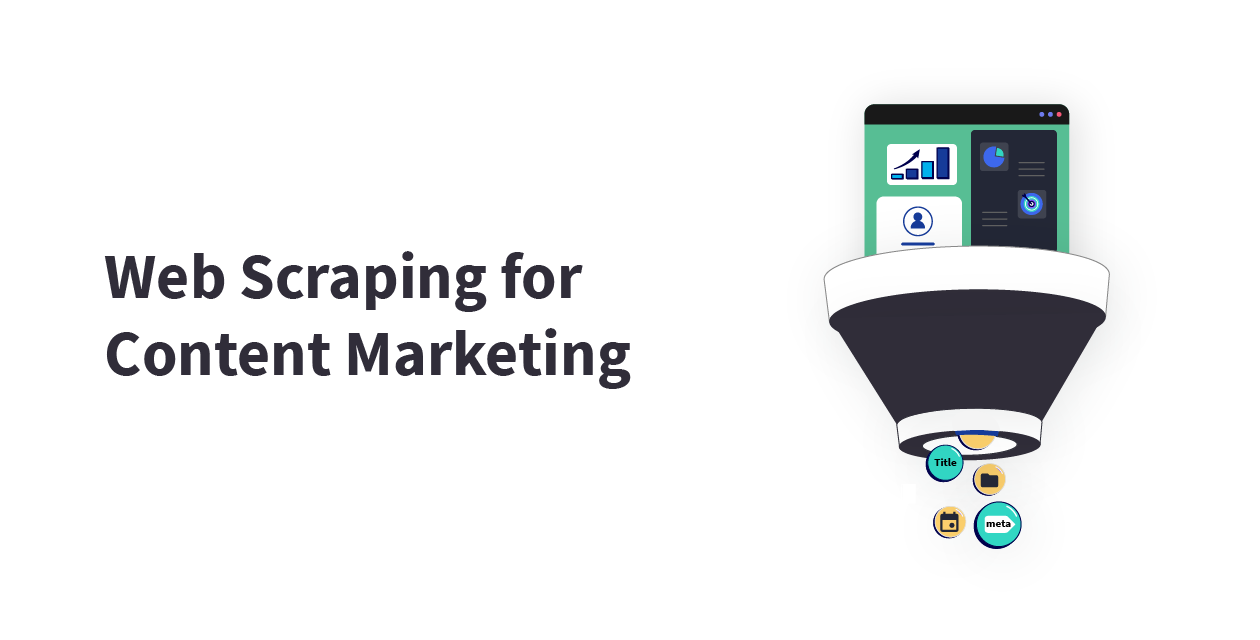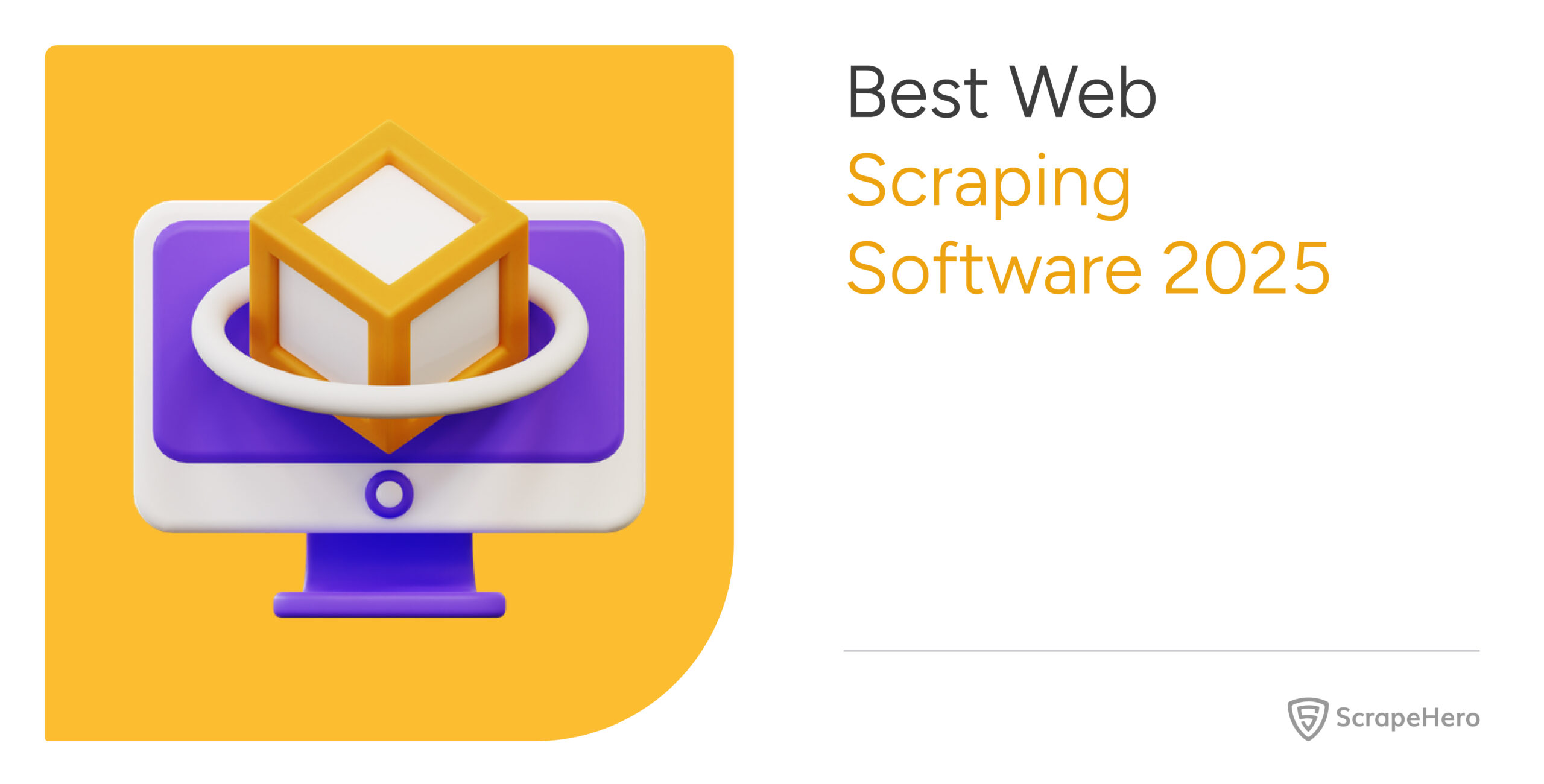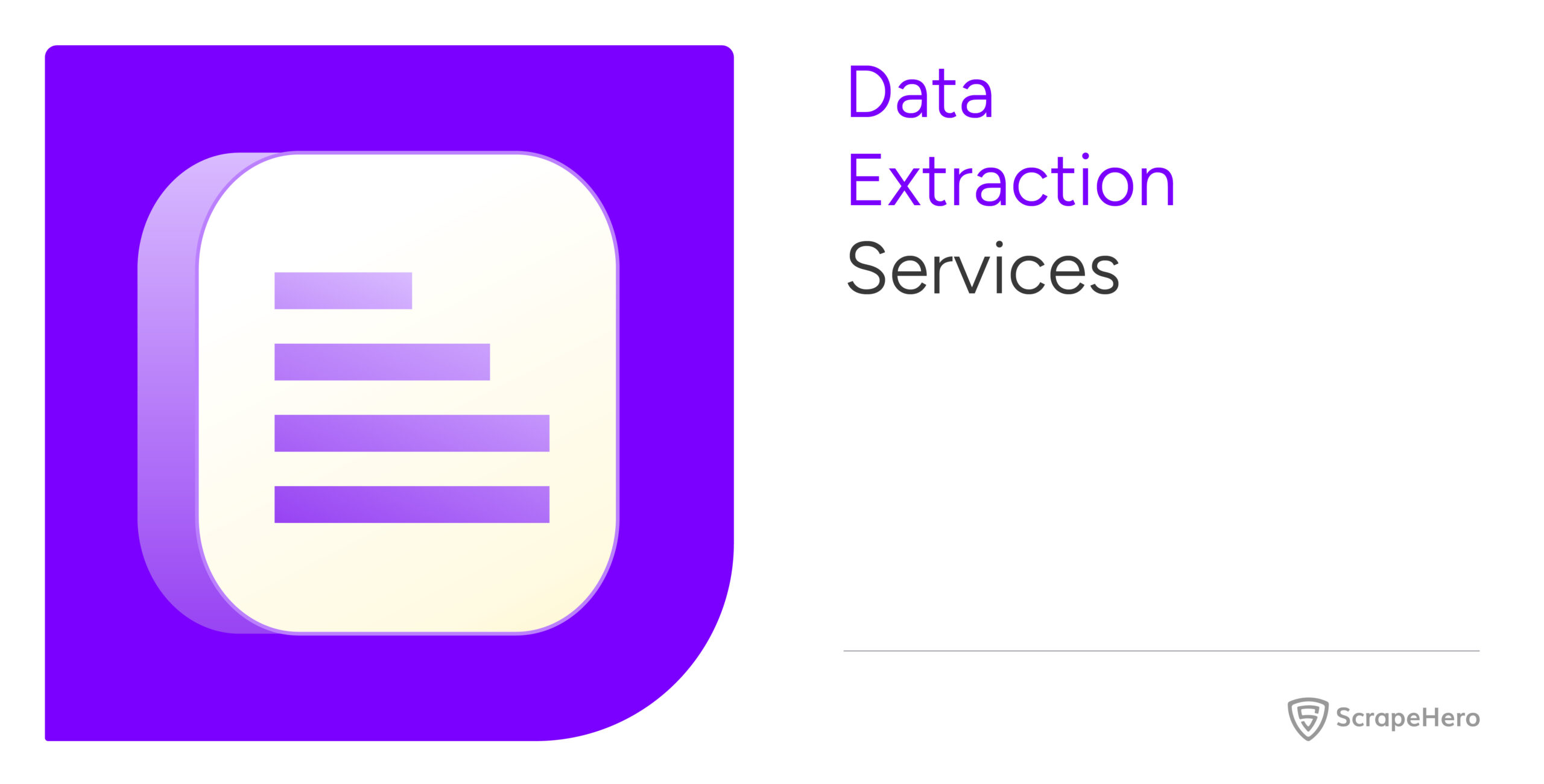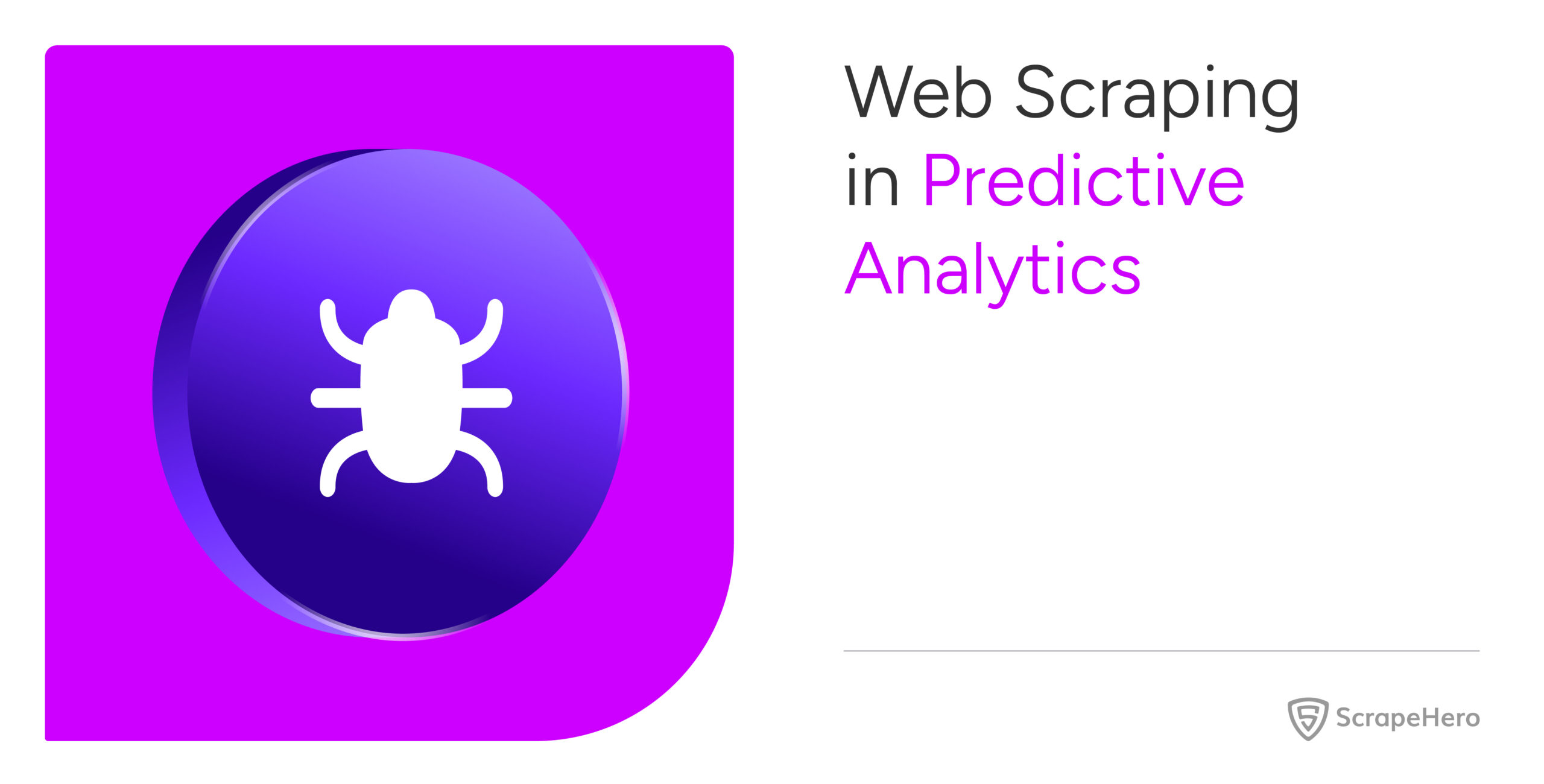A sound content marketing strategy can help shape your brand identity, attract audience interest, and retain existing readers. This requires immense research and interpretation of content available about your niche, the first step being data collection. By automating the data collection process, you’ll have more time to focus on creating valuable content for your audience. Web scraping is the answer to this automation, and this article explores the what, how, and why of web scraping for content marketing.
What is Content Marketing?
Content marketing is the practice of producing and disseminating valuable, relevant material online—think blog posts, videos, podcasts, and social media updates—with the goal of engaging your target audience.
Unlike traditional advertising, this strategy isn’t about hard-selling your products or services. Instead, it’s about establishing your brand as an authority in your field, keeping your business on the radar for when customers are ready to make a purchase.
By consistently delivering useful content, you cultivate a loyal audience that’s more likely to choose your brand when it’s time to buy. The method aims to retain existing customers and attract new ones, all while building a reputation for expertise and reliability.
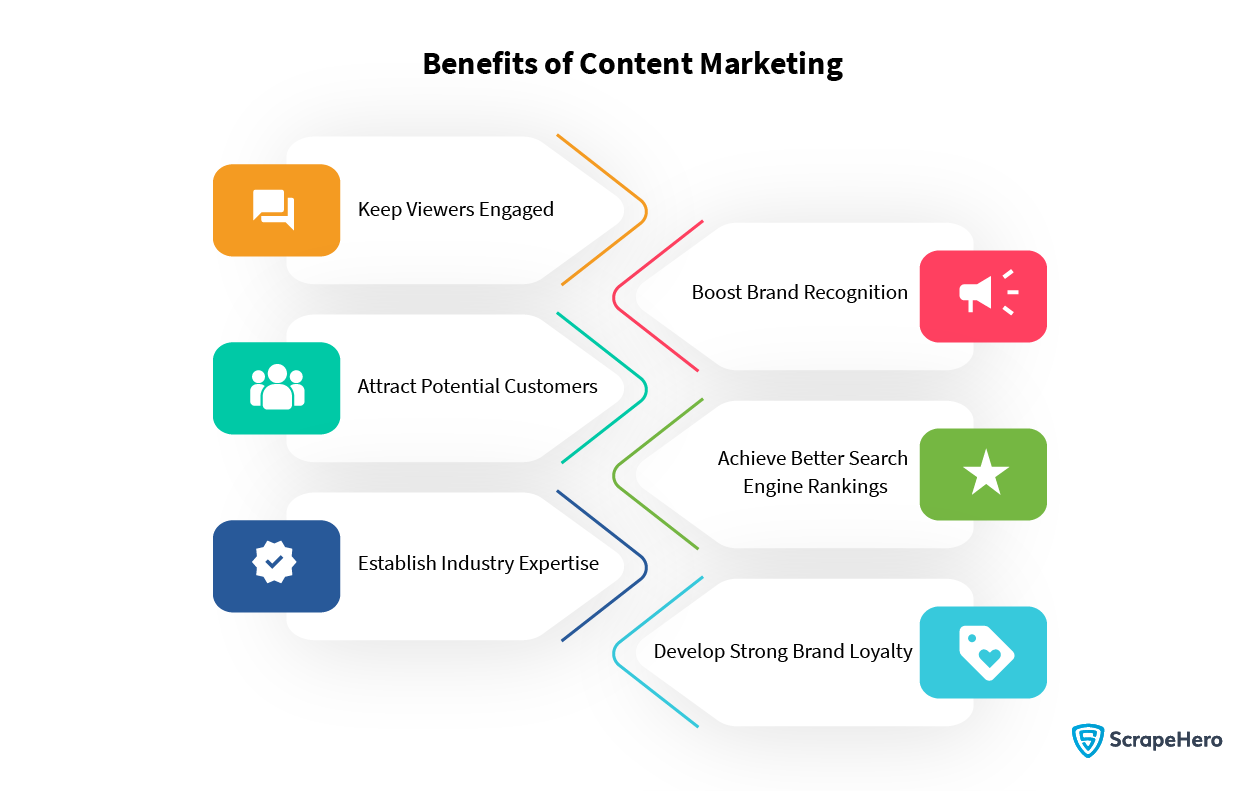
Relevance of Web Scraping for Content Marketing
In content marketing, there are several challenges that marketers might have to deal with. One such hurdle is determining the type of content that would resonate with your product or service niche. Although traditional market analysis can provide some insights, it can be time-consuming and may not scale well.
Fortunately, there is a solution to this problem: web scraping. In simple terms, web scraping is the process of extracting data from websites. Data can be pulled from websites, and you can use it to inform your marketing practices. It can help enhance your understanding of the target audience and website traffic and also generate more leads.
Instead of manually scouring the web for valuable content that would enrich your audience, you can employ web scraping for content marketing. Scrapers can crawl hundreds of websites quickly, pulling large amounts of data that can help you identify the most effective content for your website.
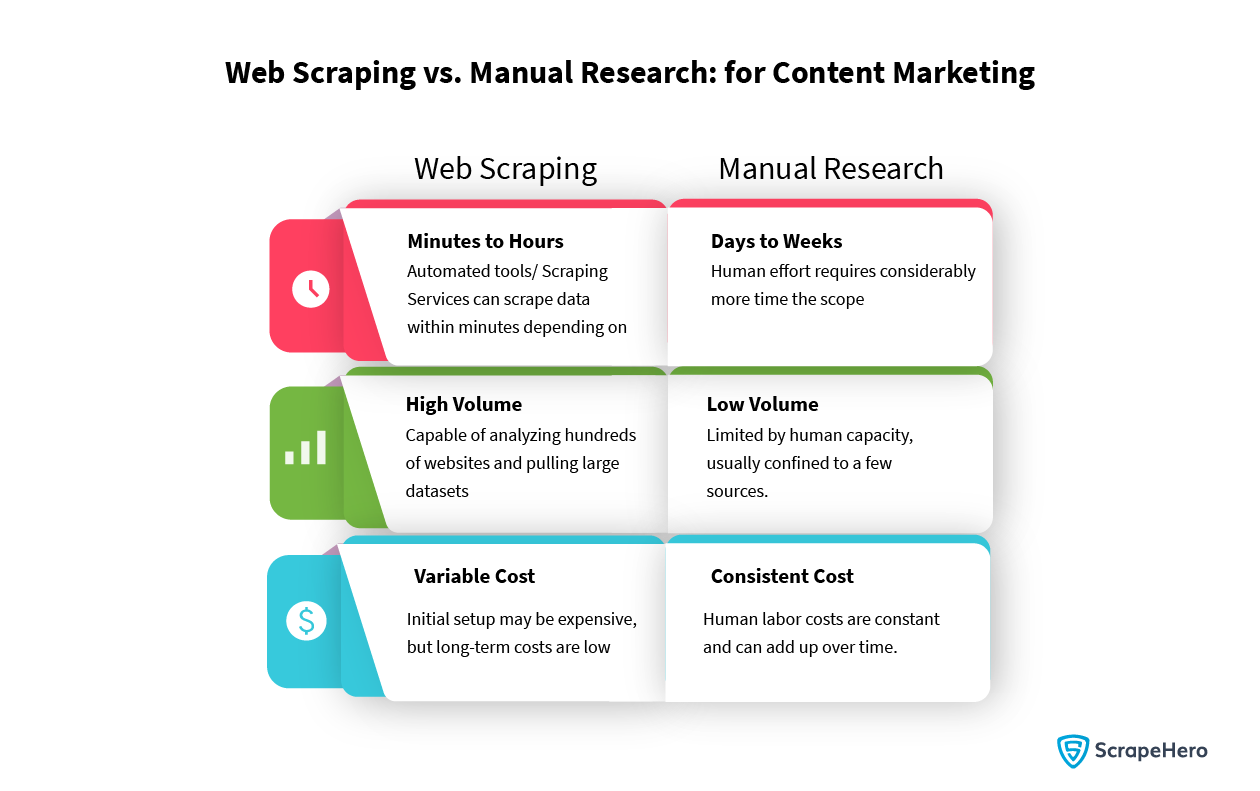
Web scraping does more than just find the right content. It also enables businesses to track their own performance metrics, monitor competitors, and even identify trends before they become mainstream. Web scraping for content marketing can provide a competitive edge, giving you actionable insights that could make the difference between a successful campaign and a lackluster one.
How Web Scraping for Content Marketing Can Yield Results
Here are a few ways in which you can use web scraping to boost your content marketing efforts.
Scrape Organic Keyword Results
Targeting high-intent, relevant keywords and structuring your campaigns effectively are crucial to driving organic traffic. By scraping for organic search results on the web, you can make changes to your content, improve your ranking on Google, and maintain the best spots on Google search result pages.
You can use the Google Search Results scraper from ScrapeHero Cloud to gather the data on your own, monitor how well your website is performing, and boost your content visibility. The data is presented to you in CSV, Excel, or JSON format and can be downloaded easily. Besides, free tools such as SEMrush and SE Ranking can help you track rankings and find the right keywords.
Scrape Paid Results/Adwords
Google Adwords can play a key role in marketing your product, driving traffic to your site, and getting leads. While organic search ranking is an important factor, you also need to invest time and effort into other website performance fields. With Adwords, your business can rank on the top of the first page of Google search results on par with your competitors.
Understand What Your Key Audience Likes
Web scrapers can extract data available from social media channels, video platforms, likes and comments on articles, and other related information. This helps you understand your customer preferences and buyer persona and determine the content your audience loves. Performing sentiment analysis can also help you find out how people feel about your products and services, along with your competitors.
Scrape Forum Data
Web forums are a great place to exchange individual views and discuss various topics. By scraping data from forums, you can discover topics that are related to your brand in the target market. You can identify topics with a high number of upvotes and downvotes. One of the ways to build backlinks is by finding questions related to your business in forums and responding with your article’s link.
Time Your Social Media Posts Well
To ensure posts receive maximum engagement, you need to schedule them during peak hours. Manually checking social media profiles for timestamps of competitor posts is exhausting.
With web scraping for content marketing, you can find the best time to post your content by scraping the timestamp of previous posts on different platforms. This extracted data can help you analyze and understand if the timing of your posts affects the traffic.
Expedite Research and Data Preparation
Securing data from the web can be tedious and expensive. A simpler way is to use a web scraping tool or solution. All you need to do is carry out preliminary research on the internet and select the required search keywords.
Your custom web scraping provider can gather the scraped search results. Data can be collected from different sources, such as white papers, financial reports, and market audits.
This data can help create infographics, video content, charts, or any other visual aids using business intelligence tools. You can create articles or videos with persuasive and credible visuals that will leave a mark on your readers.
Find Contacts of Guest Bloggers
You can search for articles on channels such as Medium to find bloggers that fit your criteria or can write content for your website. By extracting the details using web scraping, you will be able to get access to contacts who can write web articles that will add great value to your blogs. You can reach out to them, and they might agree to contribute to your site if they find your content helpful, which is a great way to boost SEO.
Data Fields to Scrape for Content Marketing
Knowing what data can be extracted helps refine your content marketing strategies and target your audience more effectively.
Here are the most common data fields extracted while web scraping for content marketing:
Title: This serves as your content’s first impression and is critical for SEO.
Meta Description: These snippets influence click-through rates and are vital for SEO strategy.
Author: Knowing who wrote an article can offer insights into the level of expertise or bias involved.
Published Date: This data is crucial for understanding the freshness of the content.
Website: Identifying the source can help you assess the credibility of the data you’re collecting.
Content: The actual text can be analyzed for tone, keywords, and quality.
Category: This field can help you understand the context or industry relevance of the content.
Stats: Quantifiable metrics, such as page views or social shares, can offer insights into content popularity.
Backlinks: Knowing where traffic comes from can guide you in building partnerships and identifying influencers.
Keywords: These serve as the backbone for SEO, helping you understand how users find the content online.
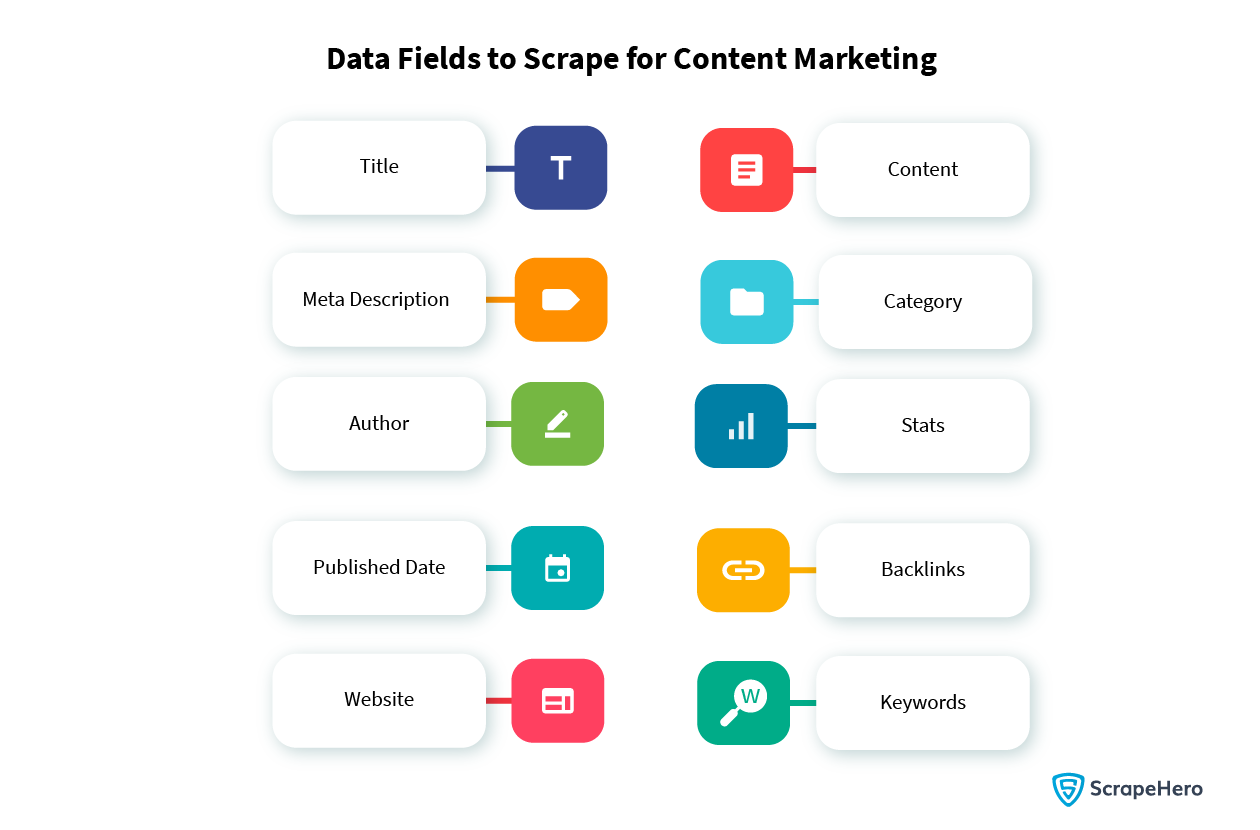
From this, it can be concluded that scraping metadata is essential when it comes to web scraping for content marketing. ScrapeHero Cloud’s Meta Data Scraper easily automates this task for you.
How to Scrape Data for Content Marketing
There are multiple ways you can implement web scraping for market research:
Build Content Scrapers
You can code content scrapers for marketing by using languages such as Python and JavaScript supported by browser automation frameworks like Playwright. However, this endeavor is tedious and requires quite a bit of technical expertise.
Maintaining an in-house infrastructure solely to scrape data for content marketing is not cost-effective. This becomes much more apparent when your primary business goal is not data-centric.
Use Pre-built Scrapers
There are many pre-built scrapers available online that can be used for Data Scraping for Content Marketing. Prebuilt Scrapers require minimal or no programming knowledge and are a great choice for extracting structured data.
Such scrapers often extract predetermined fields of data and are limited when it comes to customizability. These scrapers come in handy when your requirements are not vast. For instance, the Google Search Results Scraper from ScrapeHero Cloud is ideal for web scraping for digital marketing data.
Don’t want to code? ScrapeHero Cloud is exactly what you need.
With ScrapeHero Cloud, you can download data in just two clicks!
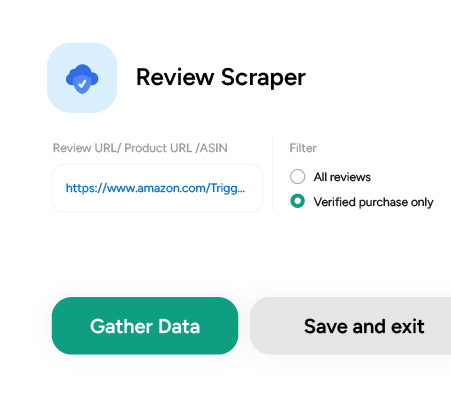
Custom Web Scraping Services
For a business trying out web scraping for content marketing, consulting custom web scraping services is the way to go. A custom service provider offers the flexibility to scrape any kind of data fields that would benefit your marketing research. With a service, you can scrape the vast amount of data records required to arrive at a comprehensive market analysis.
Outsourcing web scraping for content marketing to a provider like ScrapeHero is a much more cost-effective solution than employing a team internally to do the same. This frees up time and resources that can be dedicated to other critical tasks.
Gather Data Using ScrapeHero
As discussed so far, data can be used in several different marketing techniques. A one-size-fits-all approach is seldom practical when selecting a data scraping solution. ScrapeHero Cloud has pre-built crawlers and APIs that cater to a wide range of data verticals that can help you extract data in the most cost-effective and simple manner.
If you would like to monitor data on a large scale, you can use our web scraping provider, which can reliably gather data on your own schedule. ScrapeHero can build custom web scraping APIs for websites to help you achieve this. As you customize web scraping solutions, you can easily target the data fields that align with your marketing needs.
Frequently Asked Questions
Can you get banned for web scraping?
If a website detects that you’re not complying with the rules outlined in its robots.txt file, you will get blocked or, essentially, ‘banned’ from scraping. Certain websites also have anti-scraping measures to prevent web scraping.
How do I use web scraping for SEO?
Web scraping can help with SEO by analyzing search engine results pages (SERPs) and identifying keywords that impact website rankings—additionally, scraping trending topics and viral content aids in content creation and strategy development.
Is it ethical to scrape a website?
Web scraping can be done ethically by following certain practices.
Ethical web scraping involves requesting data in a reasonable manner to avoid overloading websites and getting blocked. Web scraping services like ScrapeHero are experienced in “politely” requesting data and managing web scraping activities in compliance with website policies. Following these ethical practices ensures the smooth execution of web scraping tasks without disrupting website operations or facing potential legal consequences.
How do I scrape content from a website?
To scrape content from a website, firstly, you have to crawl the website and learn what content is present in it. Then, scrapers will parse this crawled data with CSS selectors or Xpaths. Next, the data extracted is cleaned for readability and easy comprehension. Finally, it is stored in a database.
What is web scraping in marketing?
Web scraping allows for a detailed examination of competitor offerings, from new product releases to marketing strategies. Furthermore, it’s feasible to tap into crowd sentiment by collecting data from social forums, reviews, and comments. In SEO, web scraping provides a means to study search engine result patterns, helping you track down relevant focus keywords. It also provides a way to identify trending topics and viral content, which can refine your content creation and strategic planning.
Turn the Internet into meaningful, structured and usable data
We can help with your data or automation needs

